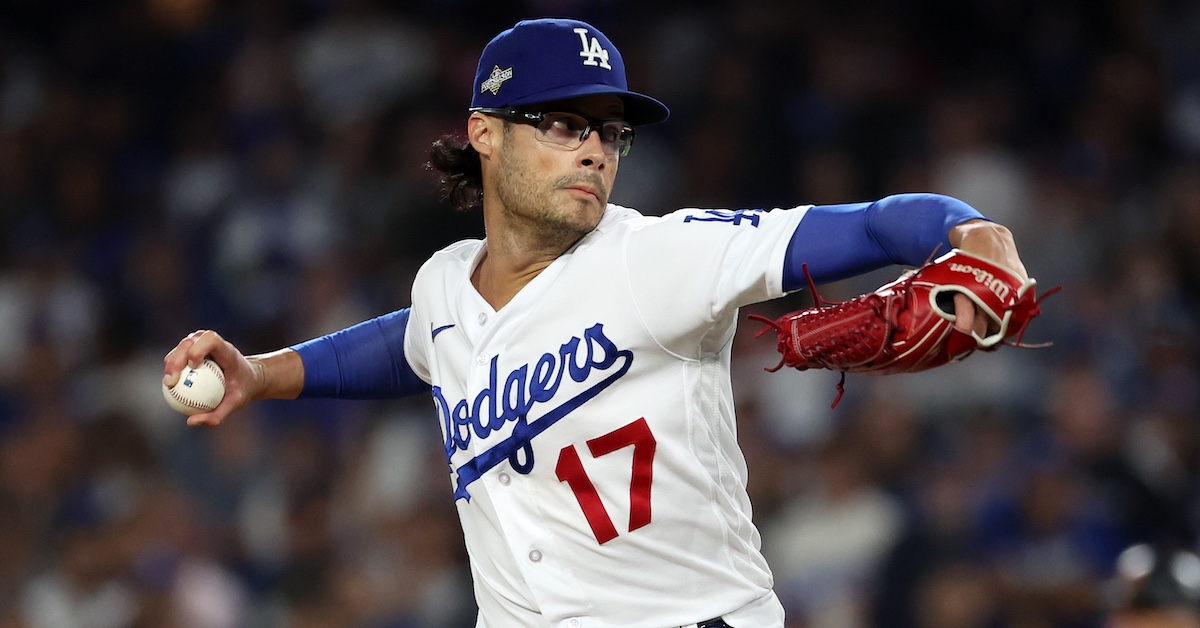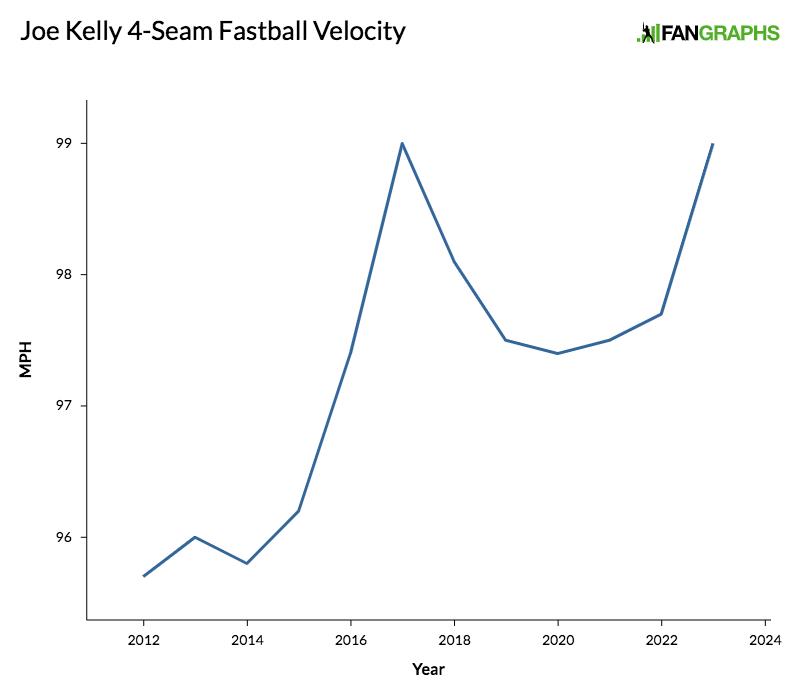
Kiyoshi Mio-USA TODAY Sports
The Los Angeles Dodgers and right-hander Joe Kelly did a whole bunch of paperwork just to end up back in business together. In November, the Dodgers declined a one-year, $9.5 million option on Kelly, buying the right-hander out for $1 million and sending him into free agency. This week, the two parties agreed to terms on another contract, reportedly for one year and $8 million. Nobody likes to take a pay cut, but for Kelly, who was born in Anaheim, that’s $9 million in his pocket to stay put instead of $9.5 million – ultimately a pretty friendly outcome after the option decision didn’t go his way.
If you’ve tuned in to the postseason in the last decade, you’re probably familiar with the work of Kelly, who started a World Series game for the Cardinals in 2013, earned his first ring with the Red Sox with a dominant October in 2018, and pitched for the Dodgers in four of the last five postseasons, winning his second World Series in 2020. He helped set up a pair of future Hall of Fame closers in their only World Series seasons (so far) two years apart in Craig Kimbrel and Kenley Jansen. Since the start of his career, the only pitchers with more postseason appearances than Kelly’s 41 are Jansen, Ryan Pressly, and Aroldis Chapman:
Most Postseason Appearances Since 2012
As the Dodgers know as well as anyone, the value proposition on Kelly is pretty straightforward – he throws his fastballs extremely hard, and backs them up with high-spin breaking balls and the occasional changeup. It’s a formula that has served Kelly well for the better part of a decade since shifting into full-time bullpen work while in Boston:
Joe Kelly’s Percentile Rankings
| Year |
FB Velo |
CB Spin |
| 2015 |
90 |
93 |
| 2016 |
95 |
95 |
| 2017 |
100 |
96 |
| 2018 |
100 |
98 |
| 2019 |
98 |
99 |
| 2020 |
94 |
97 |
| 2021 |
97 |
92 |
| 2022 |
96 |
91 |
| 2023 |
98 |
95 |
SOURCE: Statcast
The risk in signing a player like Kelly is just as apparent: He’s an aging reliever whose calling card is velocity and who’s dealt with a myriad of injuries in recent seasons. In 2022, it was a right biceps nerve injury, and then a strain of his left hamstring. This past season, he was sidelined by a right groin strain, then right elbow inflammation, and then right forearm inflammation. None have kept him out for too extended a period, but all told, he’s had eight stints on the injured list since 2021 and hasn’t thrown as many as 45 innings in any of those years. That’s a fair reason to balk at using some of the bullpen budget to retain him:
Joe Kelly’s IL Stints Since 2020
| Date Placed |
Date Activated |
| August 10, 2020 |
September 10, 2020 |
| April 1, 2021 |
May 6, 2021 |
| August 10, 2021 |
August 25, 2021 |
| October 23, 2021 |
October 24, 2021 |
| April 4, 2022 |
May 9, 2022 |
| May 26, 2022 |
June 14, 2022 |
| April 10, 2023 |
April 24, 2023 |
| July 6, 2023 |
July 22, 2023 |
| August 13, 2023 |
September 13, 2023 |
What’s been unique about Kelly’s velocity, though, is that not only has it lasted into his mid-30s – Kelly turned 35 in June – but last season, he matched his career-high four-seam fastball velocity at 99.0 mph. Coming into the league as a starter in 2012, Kelly’s four-seamer averaged 95.7 mph. As he transitioned into the bullpen, it rose to a peak of 99.0 mph in 2017 before settling in around 97.5 for most of his first Dodgers tenure. But last season (in only 39.1 innings, mind you), he was throwing as hard as he ever had, averaging 99.0 mph on his four-seamer and 98.9 mph on his sinker. On May 28, he hit 101.3 on the Statcast gun, his fastest pitch since he turned 30. There aren’t a lot of 35-year-olds whose fastball velocity trajectory looks like this:

Just how impressive is it for a 35-year-old to be averaging 99.0 mph on his four-seamer? Prior to 2023, it hadn’t happened in the Statcast era. Kelly and Chapman became the first to do so this season. In fact, the only other pitcher over the age of 30 to average 99.0 mph or more on his four-seamer was Jacob deGrom in 2021 at the age of 33:
Fastest Four-Seamers in Age 30+ Season
| Name |
Season |
Age |
vFA |
| Jacob deGrom |
2021 |
33 |
99.2 |
| Joe Kelly |
2023 |
35 |
99.0 |
| Aroldis Chapman |
2023 |
35 |
99.0 |
| Jacob deGrom |
2022 |
34 |
98.9 |
| Jacob deGrom |
2023 |
35 |
98.7 |
| Jimmy Cordero |
2023 |
31 |
98.7 |
| Aroldis Chapman |
2018 |
30 |
98.7 |
| Jacob deGrom |
2020 |
32 |
98.6 |
| Luis García |
2021 |
34 |
98.3 |
| Aroldis Chapman |
2021 |
33 |
98.3 |
| Ryne Stanek |
2022 |
30 |
98.3 |
*StatCast era, min. 30 IP
When Kelly has been on the mound, it’s all worked pretty well as of late. Despite a 4.12 ERA in 2023, he had a much friendlier 2.93 xERA, 2.72 FIP, and 2.61 xFIP – the advanced run prevention metrics are in unanimous agreement that he had some unfortunate bounces. In 2022, it was the same story – a 6.08 ERA stuck out like a sore thumb amid a 3.15 xERA, 3.06 FIP, and 3.16 xFIP. Kelly has thrown just 120.1 innings since 2021, but he has a 2.96 FIP and a 2.98 xFIP (despite a 4.26 ERA), with 163 strikeouts against just 520 batters faced (31.3%). He’s gotten away with an elevated walk rate thanks to a lot of swing and miss and a strong contact profile. Hitters have averaged an exit velocity of just 85.4 mph – the seventh-lowest among nearly 500 pitchers with as many as 250 batted balls against them in that time. Kelly has limited opponents to a .274 xwOBA.
The Dodgers bullpen may be in need of some depth after losing veterans Ryan Brasier, Shelby Miller, and Daniel Hudson to free agency. But Kelly returns to a group anchored by Evan Phillips in the closing role, with Brusdar Graterol, Caleb Ferguson, Alex Vesia, and Yency Almonte available to take on bulk roles again in 2024, and righty Blake Treinen set to return from his shoulder injury. This group was the top bullpen in baseball last season with 7.6 WAR, and with plenty of offseason left, they’re already in good shape to be a well-resourced group again in 2024. Despite his own injury concerns, Kelly’s ability to maintain his velocity should offer the Dodgers some comfort that he can still be a weapon in the high-leverage contingent of their relief corps – as long as he’s healthy.
Major League Baseball is unique in that the players are largely protected from losing out on their contracts as a result of injury – a humane practice when we consider that, after all, these players are people first. But when it comes to contract analysis, and absent the ability to predict the future, we’re sometimes left with a pretty simple if unsatisfying answer: If Kelly is healthy enough to pitch, this move will likely be remembered as a relative bargain. If not, it may look like too much faith in an oft-injured 35-year-old.
Source
https://blogs.fangraphs.com/the-dodgers-just-cant-quit-joe-kelly/
 Backyard GrillingWeekend WarriorsAdvice from DadBeard GroomingTV Shows for Guys4x4 Off-Road CarsMens FashionSports NewsAncient Archeology World NewsPrivacy PolicyTerms And Conditions
Backyard GrillingWeekend WarriorsAdvice from DadBeard GroomingTV Shows for Guys4x4 Off-Road CarsMens FashionSports NewsAncient Archeology World NewsPrivacy PolicyTerms And Conditions
